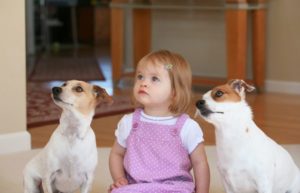Are you ready to prepare your pooch for a new baby? Make sure you know the myths from the facts when it comes to dogs and babies.
If you think you know everything there is to know about ensuring your dog and baby will live in harmony together, don’t be so sure until you read these five common myths busted by the experts. From the best ways to introduce your pet and newborn to the most important time to foster a friendship between the two, we asked top trainers to reveal the biggest misconceptions aboutdogs and babies.

Dog and Baby Myth #1: Bring a blanket home for Fido to sniff.
Many experts advise letting your dog smell a blanket that your baby has been wrapped in at the hospital before he comes home. But Colleen Safford, a New York City dog trainer known as the, says, “don’t bother!” Here’s why: Chances are you don’t let your dog sniff the belongings of other house guests before they come over for the first time, so why would you do this with your new baby? “It’s not the smell of the baby that will upset or intrigue your dog, it’s all the other things that go along with it,” says Safford. A better option is introduce your dog to the sites, sounds and smells of Baby’s stuff like the vibrating bouncy seat, the moving swing with lights, jingling plush toys and scented baby lotions. This way your pet can get acquainted with these objects before the newborn’s arrival.
Dog and Baby Myth #2: The training begins when Baby comes home.
Ideally, you should start prepping your dog for baby when you find out you are pregnant. Even the most docile creatures could use a brush up on behavior to ensure they respond well tolike “leave it,” and “to your place.” You should also try mixing up your pet’s routine, as it will likely be a challenge to follow Fido’s regular schedule later. And while it may be harder for you than your dog, giving your fur baby less attention in the months leading up to your new addition’s arrival can help prepare him for the inevitable drop in attention later.
Dog and Baby Myth #3: You shouldnt let your dog get close to your baby.
“Older generations, like Baby’s grandma, often think animals and babies shouldnt be close to one another and in turn, have a tendency to push animals away,” says Mary Papnik, instructor of the Baby Ready Pets course taught atin Pittsburgh, Pennsylvania. But you should never shoo pets away. “Pushing pets away can make them feel unwanted around the baby,” says Papnik. This can create other behavior problems and jealousy issues. It’s better to let animals safely sniff Baby, staying alert, and encouraging positive interactions to foster a healthy relationship.
Dog and Baby Myth #4: The hardest part is when Baby first arrives.
If your pup and baby get along on day one, you’re in the clear, right? Not necessarily. “A lot of people spend time focusing on baby’s arrival, but it’s important to develop a healthy relationship later too,” says Safford. The most strained time for families is typically during the toddler phase she says. When your baby turns 6 months old, he’ll set his eyes on dog and many moms take the opportunity to encourage him to explore the pet. Safford advises against this. Dogs and babies should simply coexist and focus on parallel play rather than touching. You can’t expect that your baby will always be gentle with the dog, and you can’t expect your dog to handle having his ears and tail tugged. The next challenge? When Baby starts crawling.
Dog and Baby Myth #5: If your dog seems comfortable with your baby, it’s safe to leave them alone.
No matter how much you love and trust your pet, you must remember that dogs are animals and you can’t always predict their behavior. “Pets and babies should never be alone in the same room unsupervised,” says Papnik. If you have to leave the room, even just to go to the bathroom, take your dog with you, she says. You should also be sure to stress to babysitters and other caregivers that they must have the same diligence about not leaving Baby and dog in the same room together.



















